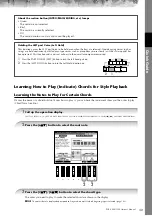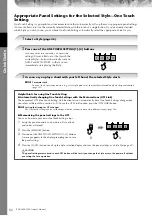
Quic
k Guide
PSR-3000/1500 Owner’s Manual
49
Learning How to Play (Indicate) Chords for Style Playback
Learning the Notes to Play for Certain Chords
If know the name of a chord but don’t know how to play it, you can have the instrument show you the notes to play
(Chord Tutor function).
[FUNCTION]
→
[C] STYLE SETTING/SPLIT POINT/CHORD FINGERING
→
TAB[
√
][
®
] CHORD FINGERING
The notes you need to play to make the selected chord are shown in the display.
n
The notes that are displayed correspond to Fingered, no matter which fingering type is selected (page 103).
About the section button (INTRO/MAIN/ENDING, etc.) lamps
• Green
The section is not selected.
• Red
The section is currently selected.
• Off
The section contains no data and cannot be played.
Holding the LEFT part Voice (Left Hold)
This function causes the LEFT part Voice to be held even when the keys are released. Non-decaying voices such as
strings are held continuously, while decay-type voices such as piano decay more slowly (as if the sustain pedal has
been pressed). This function adds a natural richness to the overall accompaniment sound.
1
Press the PART ON/OFF [LEFT] button to turn the left-hand part on.
2
Press the [LEFT HOLD] button to turn the Left Hold function on.
2
1
1
Call up the operation display.
2
Press the [6
π
π
π
π†
†
†
†
] button to select the root note.
2
3
3
Press the [7
π
π
π
π†
†
†
†
]/[8
π
π
π
π†
†
†
†
] button to select the chord type.






























